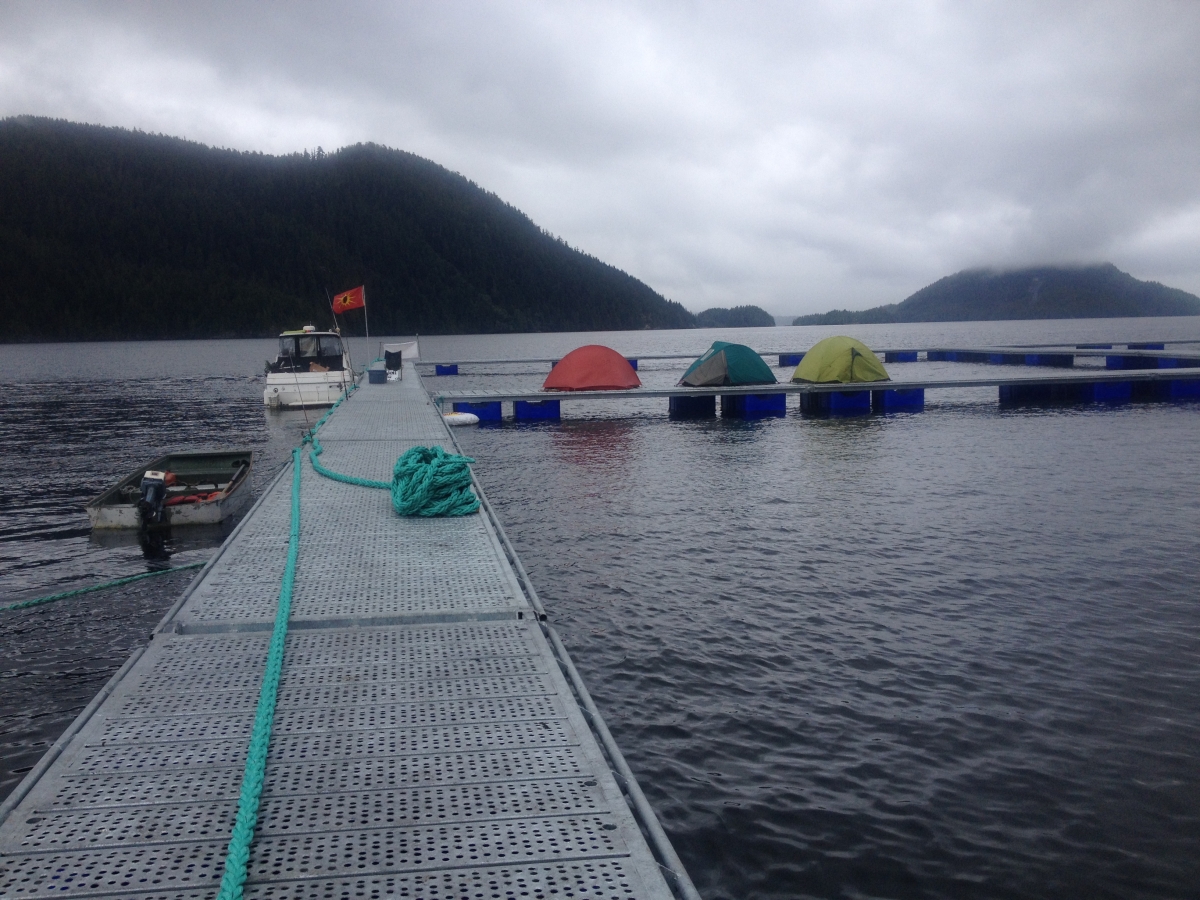Like our environmental coverage? Chip in to keep stories like these coming.
A new salmon farm in Clayoquot Sound on Vancouver Island was dismantled and hauled away last week after being occupied by members of Ahousaht First Nation and local supporters from Tofino.
“This is the very first salmon farm that’s pulled out of B.C. because of protesters,” said Alexandra Morton, an independent salmon research scientist who has documented the devastating impacts of salmon farms on wild salmon and other marine species. Morton was part of the two-week occupation.
Lennie John, an Ahousaht man, was the first to tie his boat to the floating fish pens in the long narrow channel near the eastern shore of Flores Island with its intact ancient cedar rainforest and many creeks supporting runs of wild salmon. This is also home of the Ahousaht First Nation. Cermaq, a Norwegian-based salmon farming company (recently purchased by the Japanese conglomerate Mitsubishi) was granted permits this summer to install its 16th farm in Clayoquot Sound.
“We blocked Cermaq’s access and told them they were trespassing,” John, an Ahousaht tourism business owner, said.
“You wouldn’t want someone to come into your house and make a mess,” John told more than 100 people attending a Clayoquot Action event, called “Take a Stand for Wild Salmon,” in Tofino last Wednesday. Clayoquot Action is a local environmental organization.
John was soon joined by others who literally camped on the steel catwalks that frame large salmon net pens that can hold up to a million Atlantic salmon at a time when fully stocked. The group spent two weeks camped on the open water despite the very windy and wet weather the region is known for.
“I’m tired of being told to keep quiet. A handful of warriors stopped this. Imagine what a Nation could do?” John said.
“We want to get rid of all the fish farms on our territory,” John Rampanen, a member of the Ahousaht First Nation, told DeSmog Canada. There have been serious declines in shellfish, salmon and herring since salmon farms appeared in the nation’s traditional territory around 1999.
According to Cermaq’s website there is an agreement with three chiefs of the Ahousaht First Nation that covers issues such as financial and social benefits and employment. However the nation’s traditional and elected leadership ended up supporting the occupiers, Rampanen said.
Salmon are the life-force that powers the ecology and economy of British Columbia, Morton said.
“We’d be fools beyond forgiveness if we cut this off for future generations,” she told the crowd at the Clayoquot Action event in Tofino.
Morton, among others, has published scientific reports and papers documenting the impacts of salmon aquaculture on B.C.’s wild Pacific salmon, which are in sharp decline almost everywhere farms are located.
With up to a million salmon jammed into small open-ocean enclosures, disease and parasites like sea lice are common, requiring chemical insecticides and antibiotics to keep the fish from dying. As young wild salmon pass underneath the pens they are showered by sea lice. A single louse can kill a young fish, according to Morton’s studies.
Underwater “sound canons” are used to keep seals away from the net pens but also drive away orcas and other whales because of the sound pollution, Morton added. Three or more kilograms of wild fish are required as feed to produce one kilo of salmon. The ocean bottoms under and around the open-ocean net pens are usually devoid of any life, buried under the excrement of up to a million salmon overhead.
Aquaculture is big business in B.C. with about 750 aquaculture operations producing salmon, other finfish and shellfish. The total harvested value was nearly $534 million in 2010, according to government statistics.
Last May a petition with more than 106,000 signatures called on B.C. Premier Christy Clark to place a moratorium on new farms. In July, Clark approved four new farms including the one near Flores Island.
“Nothing has ever stopped these farms. Not science, lawsuits, protests or petitions. Now the blockade has stopped one. You have to put your body on the line,” Morton told DeSmog.
“We know salmon farming in the ocean is wrong. We have to do something,” Joe James Rampanen, another occupier, said.
There is widespread support for the occupiers within the Ahousaht First Nation and other communities. That support included those who have family working for Cermaq and other operators.
“They feel ashamed they’re involved but what choice do they have?” Rampanen told DeSmog.
The aquaculture industry could modify its practice of operating in pristine regions where wild salmon thrive. Rampanen said companies could raise their fish on dry land like the freshwater fish aquaculture industry does.
This column was first published on DeSmog Canada.
Photo: Alexandra Morton
Stephen Leahy is the senior science and environment correspondent at Inter Press Service News Agency (IPS) based in Rome and Montevideo. To continue this work at a time of severe cutbacks and closure of many media, Leahy launched Community Supported Journalism.
Like our environmental coverage? Chip in to keep stories like these coming.



